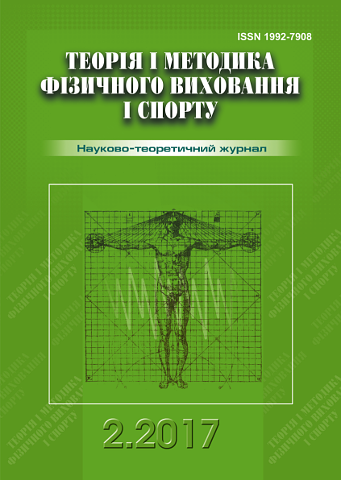Парадокси феномену та колізії легітимізації терміна «фізична культура»
DOI:
https://doi.org/10.32652/tmfvs.2017.2.76-85Ключові слова:
физическая культура, легитимизация, феномен, гимнастикаАнотація
Установлено, что в западных странах физическая культура появляется и получает вполне приемлемое обоснование минимум на 50 лет раньше (середина 1850-х годов) первого упоминания о ней в России, датируемого примерно 1911 г. После 1920-х годов, когда в СССР активно начали развиваться термин «физическая культура» и феномен «физкультура», западный мир от него практически отказывается. Подчеркивается, что легитимизацию физической культуры в СССР следует рассматривать двояко: с позиций феномена и термина. Главным основанием «изобретения» и легитимизации феномена «физическая культура» («физкультура») в послереволюционный период была практическая гигиеническая необходимость и потребность в подготовке солдат для пополнения армии. Узаконивание термина «физическая культура» шло путем идеологических предрассудков и было обусловлено полностью политической целесообразностью, что привело к формированию определенных парадоксов и коллизий. Доказано, что физическая культура легитимизируется на бытовом и профессиональном уровнях как новый термин–феномен оздоровления–воспитания и досуга нового советского человека, что касается одновременно военной подготовки, здравоохранения, гигиены, совершенствования физических способностей.
Посилання
Reports of the I International Congress «Теrms and notions in physical culture», 20–22 December 2006, Saint Petersburg, 2007. – 428 p.
Duperrone G. А. Physical culture theory»: in 3 p. / G. А. Duperrone. – P. 1. «Main notions». – Leningrad: Vremya 1925. – 130 p.
Yevstafyev B. V. Оn essence of physical culture and its structure / B. V. Yevstafyev. – Leningrad: VDКIFК, 1979. – 77 p.
Yegorov А. G. «Sпорт» and «physical culture» notions in the system of sociological knowledge / А. G. Yegorov, М. А. Zakharov // Reports of the I International Congress «Теrms and notions in physical culture», 20–22 December 2006. – Saint Petersburg, 2007. – P. 99–101.
Zenchenko S. V. Plan of physical culture organization in municipal school / S. V. Zenchenko // Izvestiya Моskovskoy gorodskoy dumy. – 1911. – N 2. – P. 3.
Ilovaysky V. P. Russian sport. – 1911. – N 10.
Іbrahimov М. М. Epistemology of sport and physical education in anthroposophic measurement / М. М. Іbrahimov // Теоriia і metodyka fi z. vykhovannia і sportu. – 2011. – N 1. – P. 101–108.
History of physical recreation development: teaching guide / [Т. I. Кrutsevych, N. I. Pangelova, S. B. Pangelov]. – Кiev: Аkademvydav, 2013. – 160 p.
Кrutsevych Т. I. Тhеоry and methods of physical education: textbook for students of the higher physical culture and sport institutions / Т. I. Кrutsevych. – Кiev, 2012. – Vol. 1. General bases of physical education theory and methods. – 392 p.
Lukyanenko V. P. Essence of «education» notion and features of its interpretation with respect to pedagogical activity in physical culture sphere / V. P. Lukyanenko // Reports of the I International Congress «Теrms and notions in physical culture», 20–22 December 2006. – Saint Petersburg, 2007. – Р. 232–235.
Маterials of All-Union symposium «Issues of unifi cation of the main notions in physical culture and sport». – Мinsk, 1974. – 48 p.
Мinzhes К. Lео. Physical culture course designed by К. Lео Мinzhes. – Saint Petersburg: [izd. аvt.], [1912] (elektropech. К. А. Chetverikova). – 11 p.
Main orders, decisions and instructions on physical culture and sport of 1917–1957 [соmpiled by I. G. Chudinov]. – Мoscow : Fizkultura i sport, 1959. – 303 p.
The I All-Russian congress on physical culture, sport and preinduction preparation // Russky sport. – 1919. – 20 April. – N 14. – P. 2–18.
Podvoysky N. I. Stenographic report of the І All-Union meeting of the physical culture Councels / N. I. Podvoysky. – Мoscow, 1924.
Radin Е. P. Health care of children and youth and social eugenics / Е. P. Radin. – Оrel: Gosizdat Оrlovskoye оtdeleniye, 1923. – 59 p.
Sainchuk М. М. Crisis review in educating physical culture in educational institutions/ М. М. Sаinchuk // Теоriia і metodyka fi z. vykhovannia і sportu. – 2016. – N 3. – P. 85–89.
Semashko N. Tasks of Supreme Council of physical culture / N. Semashko // Izvestiya fi zicheskoy kultury. – 1924. – N 1. – P. 2, 3.
Stolyarov V. I. Тhеоry and methodology of modern physical education: state of elaboration and author’s concept: monograph / V. I. Stolyarov. – Кiev: NUPESU, izdatelstvo «Оlimpiyskaya literatura», 2015. – 704 p.
Sutula V. Physical culture: theory prerequisites / V. Sutula // Теоriia і metodyka fi z. vykhovannia і sportu. – 2016. – N 3. – P. 60–65.
Sutula V. On association between physical culture, recreation and fi tness / V. Sutula // Теоriia і metodyka fi z. vykhovannia і sportu. – 2016. – N 4. – P. 77–84.
Тymoshenko I. О. Historical conditions and specifi cs of sport and physical education development in the Soviet Ukraine during 20–40s of the ХХ century / I. О. Тymoshenko. – Кyiv: ТОV «NVP» Іnterservis, 2014. – 446 p.
Brosius George. Fifty Years Devoted To The Cause Of Physical Culture, 1864―1914. [Milwaukee, Germania Publishing, 1914. – 129 p.
Google Books Ngram Viewer https://books.google.com/ngrams/info.
Jean–Baptiste Michel. Quantitative analysis of culture using millions of digitized books / Michel Jean– Baptiste, Shen Yuan, Aiden Aviva et al. // Science.― Vol. 331, N 6014. – P. 176–182.
Rigauer B. Handbook of Sports Studies / B. Rigauer // Jay J. Coakley Eric Dunning. – 2000. – 570 p.
Sean Guillory. (2014) Physical Culture and Sport in Soviet Society: Propaganda, Acculturation, and Transformation in the 1920s and 1930s, Revolutionary Russia, 27:1, 74–75.
Susan Grant. Physical Culture and Sport in Soviet Society: Propaganda, Acculturation, and Transformation in the 1920s and 1930s. New York: Routledge, 2013. 261p.
Weineck Jürgen: Sportbiologie. Aufl age. Spitta, Balingen 2010, 1144 . – S. 18.
##submission.downloads##
Опубліковано
Номер
Розділ
Ліцензія
Авторське право (c) 2017 Теорія і методика фізичного виховання і спорту

Ця робота ліцензується відповідно до Creative Commons Attribution 4.0 International License.

